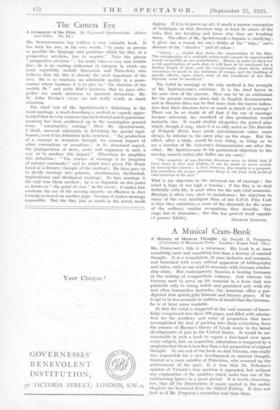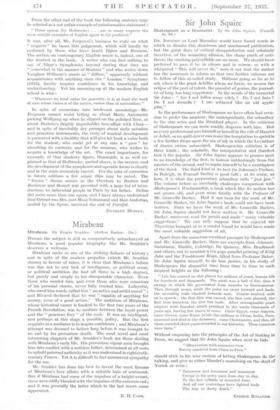A Musical Cram-Book
A History of Musical Thought. By Donald N. Ferguson. (University of Minnesota Press. London : Kegan Paul. 21s.) MR. FERGUSON'S title is a misnomer.. His book is at once something more and something less than a history of musical thought. It is a compilation, at once inclusive and compact, and furnished with every critical apparatus of bibliography and index, such as one used to associate with German scholar- ship alone. But contemporary America is beating Germany at the making of compendious volumes. And whereas the German used to serve up his material in a form that was palatable only to strong minds and garnished only with dry and often humourless footnotes, the American offers a pre- digested dish spiced„rith humour and literary graces. If he is apt to be less accurate in matters of detail than the German, he is at least more readable.
At first the mind is staggered at the vast amount of know- ledge compressed into these 500 pages, and filled with admira- tion for the assiduity and sense of proportion that have accomplished the feat of packing into them everything from the essence of Macran's theory of Greek music to the latest developments of jazz in the United States. It would be un- reasonable in such a book to expect a first-hand view upon every subject, but, on inspection,, admiration is tempered by a suspicion that there is here less than a fair proportion of original thought. At one end of the book we find Victoria, who really was responsible for a new development in musical thought, treated as a mere satellite of Palestrina, who summed up the achievement of the past. It is true that Dr. Fellowes's opinion of Victoria's true position is appended, but without any explanation of the qualities which make him one of the outstanding figures in a great period. It is worth observing, too,, that all the illustrations of music quoted the earlier chapters are borrowed from the Oxford History. It does not look as if Mr. Ferguson's researches had been deep.. From the other end of the book the following sentence may be selected as a not unfair example of uninformative statement : " Three operas (by Holbrook°) . . are in many respects the most notable examples of English opera to far prodhced."
It was, after all, Mr. Ferguson's business to state on what " respects " he bases this judgement, which will hardly be endorsed by those who have heard Dylan and Bronwen. The section on contemporary English music is, indeed, one of the weakest in the book. A writer who can find nothing to say of Elgar's Symphonies beyond stating that they are " somewhat in the manner of Brahms " and who writes down Vaughan Williams's music as " diffuse," apparently without acquaintance with anything since the " London " Symphony (1913), hardly inspires confidence in his knowledge and understanding. Yet his summing-up of the modern English school is wise :
" Whatever its total value for posterity, it is at least the work of men whose vision is of the nation, rather than of nationalism."
In spite of excursions into irrelevant anecdotage—Mr. Ferguson cannot resist telling us about Marie Antoinette picking Wolfgang up when he slipped on the polished floor, or about Brahms's (highly improbable) love-affair with Clara— and in spite of inevitably dry passages about early notation and primitive instruments, the story of musical development is presented with a lucidity that will give his book a value both for the student, who could get at any rate a " pass " by absorbing its contents, and for the amateur, who wishes to acquire a knowledge of the art. The exact importance, for example, of that shadowy figure, Dunstable, is as well ex- plained as that of Holbrookc, quoted above, is the reverse, and the development of the symphonic and operatic forms is clearly and in the main accurately traced. For the sake of correction in future editions a few minor slips may be noted. The " Eroica " theme occurs in the Overture to Bastien and Bastienne and Mozart was provided with a large list of intro- ductions to influential people in Paris by his father. Delius did write more than one opera, and I have always understood that Ortrud was Mrs. (not Miss) Teiramund and that Amfortas, healed by the Spear, survived the end of Parsifal.
DYNXLEY HUSSEY.















































 Previous page
Previous page